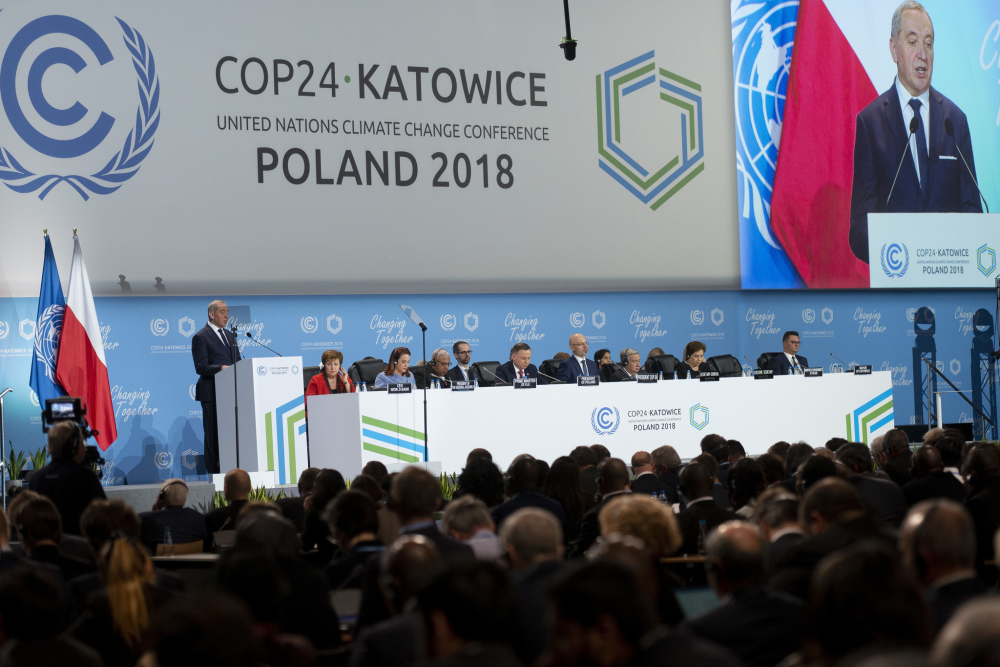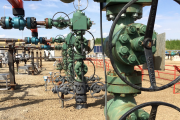Pembina Institute staff Isabelle Turcotte and Binnu Jeyakumar are in Katowice, Poland from December 2 to the 15 to follow the development of the 24th Conference of the Parties (COP) of the United Nations Framework Convention on Climate Change (UNFCCC), and what this means for climate action in Canada.
With the signing of the Paris Agreement this time three years ago, the world agreed for the first time on the importance of strengthening the global response to the threat of climate change. While only a single 27 page document, the Agreement is complex and nuanced, and for the past three years, negotiators have been defining the path to implementing it. These talks will culminate in Poland with the adoption of the rulebook.
Representing the voice of the people, David Attenborough addressed the UN delegates to kick off the climate conference last week with these words: ‘’Leaders of the world, you must lead.’’ The urgency with which all parties must act is repeatedly stated in every high level and side event at the conference. In particular, the findings of the special report from the Intergovernmental Panel on Climate Change (IPCC), published in October, dominate the conversation.
We now know that ‘’human activities are estimated to have caused approximately 1.0°C of global warming above pre-industrial levels.’’ But most significantly, the report is an irrefutable call to action to limit temperature rise to 1.5°C to avoid the worst impacts of climate change. To achieve this goal, we must reduce global emissions by 45% by 2030 and achieve carbon neutrality by 2050.
Countries — including Canada, as a signatory to the Paris Agreement — have three tasks at COP24. First, they must finalize the guidelines and schedule that will instill confidence in how they report and review their Paris Agreement pledges, referred to as Nationally Determined Contributions (NDCs). Second, they must signal how they will increase their NDCs. The Agreement features a ratcheting mechanism whereby countries must review their NDCs every five years. 2020 will mark that first five year period since the adoption of the Agreement. Third, countries have to define the rules for tracking and mobilizing climate finance to enable climate-resilient pathways in developing countries.
So far, Canada is showing leadership on all three counts. Canada’s chief negotiator told the Canadian civil society delegates last week that her team is committed to landing a strong rulebook and to provide assurances that Canada is committed to mitigation and adaptation support for developing countries. Ahead of her trip to attend this second and final week of the conference, Minister McKenna announced that ‘’Canada will be ready to set tougher emissions-cutting plans when the Paris climate change agreement kicks in by the end of 2020.’’
This is great news, as we know increased and stronger action is required. To be clear, current NDCs fall short of meeting the Paris goal of limiting temperature rise to below 2 degrees. Now that we know that every 10th of a degree makes a difference on the ecosystems that support us, the need to raise ambition has never been more critical.
Tackling climate change is synonymous with protecting our health and building a strong economy. A report launched by the World Health Organization last week shows that climate change is already having a serious impact on our health. For delegates in Katowice, the heart of Poland’s coal industry, these impacts are manifest. The air is sometimes thick with smog, making it hard to breathe. According to the report, the health benefits of meeting the Paris Agreement are substantial. This is why we’re proud of the work Canada is doing with the United Kingdom in leading the Powering Past Coal Alliance. We know that phasing out coal-fired power is essential to the environment and our health, and Canada is demonstrating how it’s done with its own 2030 phase-out goal.
This week as part of the Talanoa Dialogue - a traditional word used in Fiji (the COP23 Presidency) and across the Pacific to reflect a process of inclusive, participatory and transparent dialogue – Minister McKenna will share the story of how Canada developed and is now implementing its climate plan. Keeping global temperature in check requires a transformation in the way people produce and use energy. This translates in growing markets for accelerating renewable energy to avoid fossil fuel lock-in and stranded assets, and to increasing energy efficiency in demand sectors like industry, transport, and buildings, as well as shifting to low-carbon transportation. The clean economy is expected to grow to $26 trillion and create 65 million jobs worldwide by 2030. The Pan-Canadian Framework on Clean Growth and Climate Change (PCF) is our map to drive towards a competitive, low-carbon economy, and our starting place for increased ambition. Canada’s climate action story has been and must continue to be one of shared responsibility. Without a credible, comprehensive climate plan that delivers results, and protects our health and economy, no government can claim to be serving Canadians.
Negotiators have been hard at work all of last week, sometimes for up to 12 hours a day, to finalize the text of the Paris Rulebook. These efforts have borne some fruit through the adoption of the Local Communities and Indigenous Platforms. The Platform enables local communities and Indigenous Peoples to further engage with UNFCCC processes, including to share their valuable knowledge in the fight against climate change. Canada’s chief negotiator said that ‘’we’re at a good, but critical stage’’ of the negotiation with lots of issues to be resolved. This week, many environment ministers from around the world, including Canada’s, will join the conference and will hopefully unlock some of the sticky issues. Their ability to achieve consensus will define the world’s ability to set the Paris Agreement in motion.








